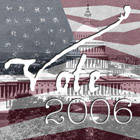
|
CONNECTICUT DEM. JOSEPH LIEBERMAN LOST HIS PARTY'S, LIKELY DUE TO HIS SUPPORT FOR PRES. BUSH'S WAR POLICY 10 August 2006 One of the nation's top Democrats, 3-term senator Joseph Lieberman, candidate for vice president in 2000 and primary candidate for president in 2004, has lost his first statewide election in a quarter century. Upstart Ned Lamont gained momentum from activist groups who helped project his anti-war message to voters throughout the state. Pundits have been quick to note that polling numbers showing Lamont leading by as much as 13 points over Lieberman in the weeks before the primary were an expression of the anger Democrats felt about Sen. Lieberman's support for Pres. Bush's Iraq war policies. Lamont won the primary by a margin of 52% to 48%, a clear victory and seen as a signal to members of both parties that voters at the grass-roots level are watching the way they decide controversial policies. Carol Darr, director of George Washington University's Institute for Politics, Democracy and the Internet, is quoted by Reuters, saying "What you're witnessing is the democratisation of democracy and don't expect it to be pretty". Darr expressed optimism about the trend involving increased grass-roots mobilization and internet activism, saying "The candidates and the parties are about to see that they are no longer in control of politics". Eli Pariser, executive director of MoveOn.org Political Action, characterized the Lamont victory as "an uprising of voters hungry for change", and said his organization was prepared to spend $15 million in support of candidates interested in "changing the course" of American politics. Top Democrats have shifted their support to the candidate chosen by the voters, and have stated their hopes that Sen. Lieberman "examine his conscience" before deciding to run for the seat as an independent. Sen. Lieberman has said he fully intends to pursue the race, and that he feels it is an obligation to his conscience and to the welfare of the nation. Republicans have been intent to characterize Lamont's campaign as evidence that a "radical left wing" has taken over the Democratic party, in hopes of reversing the trend showing that public sentiment supports the minority party more on security and counter-terrorism issues. The struggle between established figures like Joe Lieberman and the activist base of the party, could also translate into a new element of uncertainty in how the two major parties will campaign in November's Congressional elections. It is expected Republicans will attempt to consolidate the image of their party as the party of "national security", in hopes of converting public sentiment, which has in recent months abandoned this characterization, to their advantage. But Democratic activists are now energized and are talking about directing funding, volunteers and foot-traffic to constituencies where Republican senators and representatives might be vulnerable due to their support for the war or alleged ties to the Jack Abramoff corruption probe. [s]
BACKGROUND: The 2000 election process gave clear evidence that the established system for running elections and counting votes in the United States is not cohesive, not fool-proof and not secure against tampering. Congress took action to reform voting standards nationwide to "Help America Vote". But that legislation suffered one fatal flaw: while promoting the shift to touchscreen ballots, it did not require that electronic balloting machines produce a paper record that could be hand-checked. Most states' elections laws require manual recounts in cases where extremely narrow margins of victory occur, or where there are anomalies or evidence of possible wrongdoing. But as the transition has been made to electronic voting machines, many states have failed to implement solutions that permit their own laws being carried out in such cases. Repeatedly over the last 6 years, spot tests, "red-team" intensive exercise testing, and scientific studies, have shown that the most widely used touchscreen machines, which lack any hard copy of the voting process, can be tampered with, altering or even erasing vote counts or candidate selections. Without a paper record, there is no way to return to the "will of the voter" —an important legal standard— to confirm what the real substance of the electoral process was. Votes literally disappear. [Full Story] TWENTY-SIX STATES HAVE PASSED LEGISLATION REQUIRING PAPER TRAILS FOR ELECTRONIC BALLOTS Since the 2000 election, voting technology has become a major issue in US elections regimens and regulations; touchscreen balloting machines, which legislatures seem to have favored as a way to record votes accurately, eliminating the 'hanging chad' problem, were designed with no paper record and have proven insecure and susceptible to tampering. Now, 26 US states have passed laws requiring paper trails, and 13 more, plus Washington, DC, have proposed laws "not yet enacted". [Full Story] SAN DIEGO COUNTY SENT VOTING MACHINES HOME WITH POLL WORKERS ON EVE OF ELECTION Reports have emerged that according to the San Diego registrar of voters, poll workers in San Diego county took tamper-susceptible Diebold voting machines home on the eve of the election. In some cases, poll workers may have had unsupervised access to the machines for a week or longer. [Full Story] TEXAS REDISTRICTING FOUND ILLEGAL BY JUSTICE LAWYERS, FINDINGS OVERRULED New documents show Justice Department lawyers unanimously found the Texas Congressional redistricting plan to be illegal. But that finding was overruled by top Justice officials and the staff involved in the research and analysis "were subjected to an unusual gag rule", this according to the Washington Post. [Full Story] |
||||||||||||||||||||
|
|||||||||||||||||||||









